外研版高中英语选修7 Module 5 Ethnic Culture Period 5 Grammar过去分词作状语课件(29张)
文档属性
| 名称 | 外研版高中英语选修7 Module 5 Ethnic Culture Period 5 Grammar过去分词作状语课件(29张) | 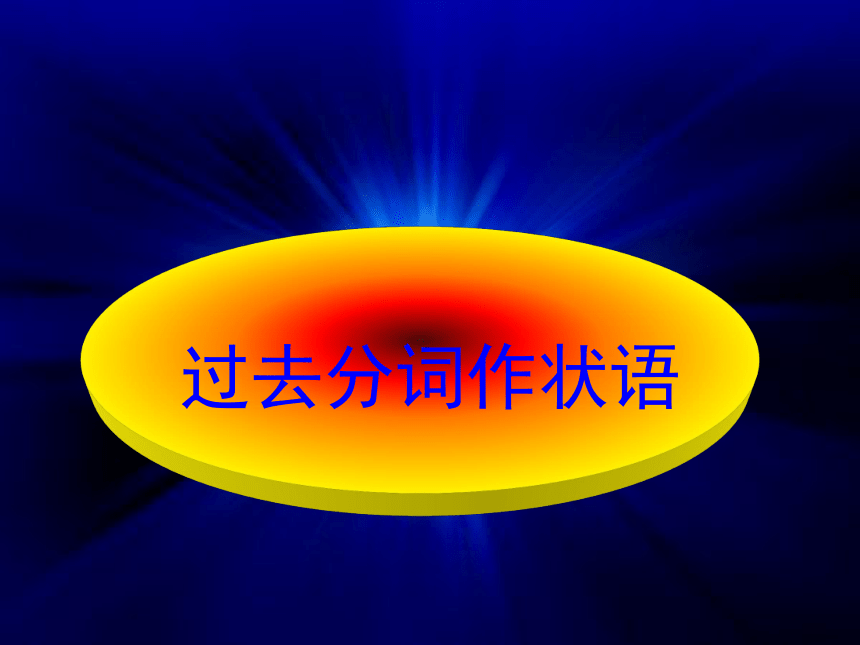 | |
| 格式 | zip | ||
| 文件大小 | 165.4KB | ||
| 资源类型 | 教案 | ||
| 版本资源 | 外研版 | ||
| 科目 | 英语 | ||
| 更新时间 | 2019-03-01 15:35:32 | ||
图片预览

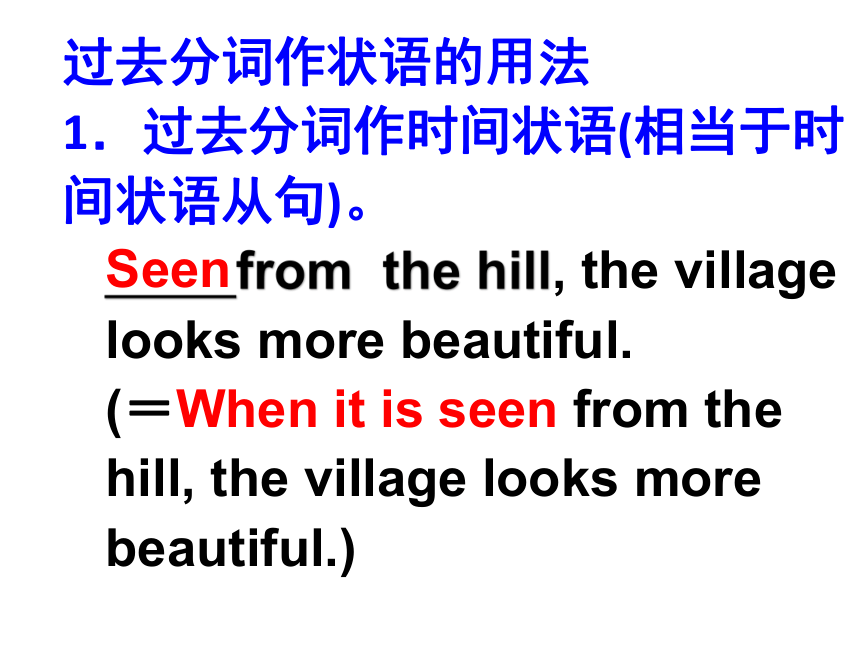
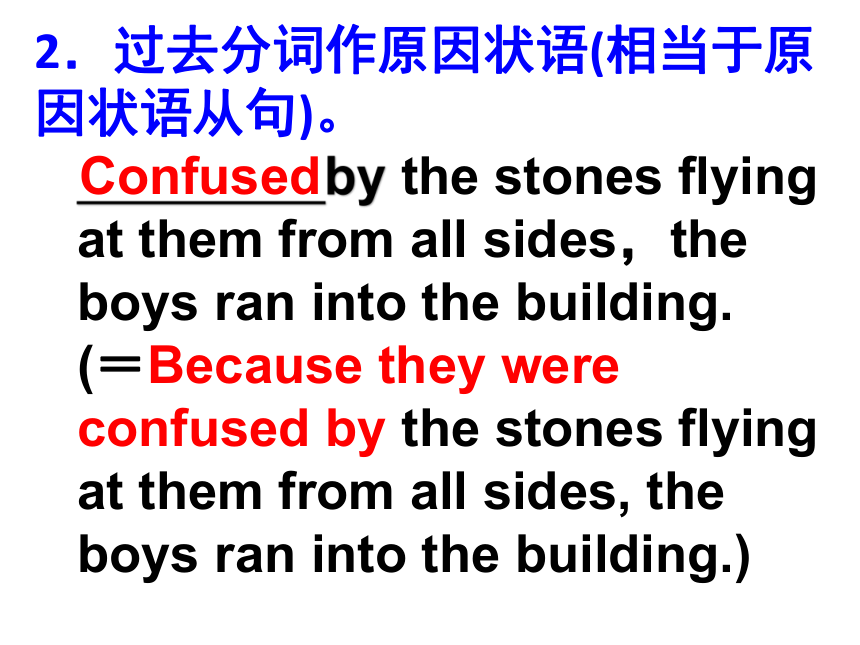
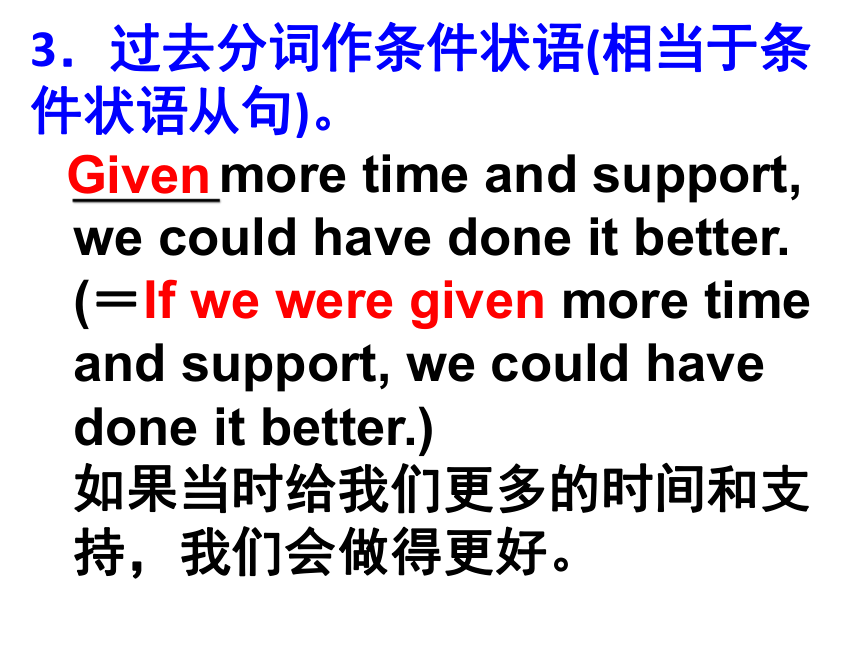
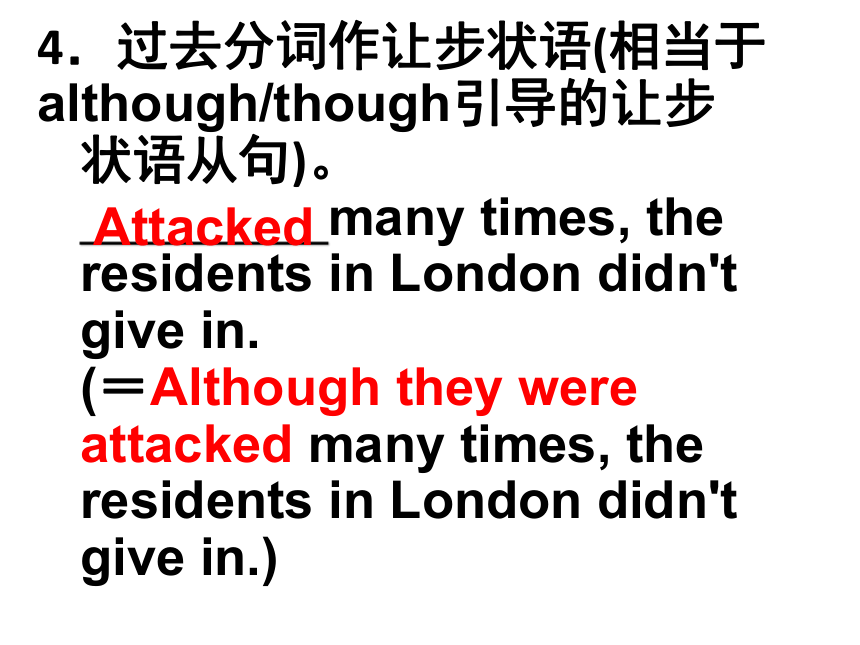
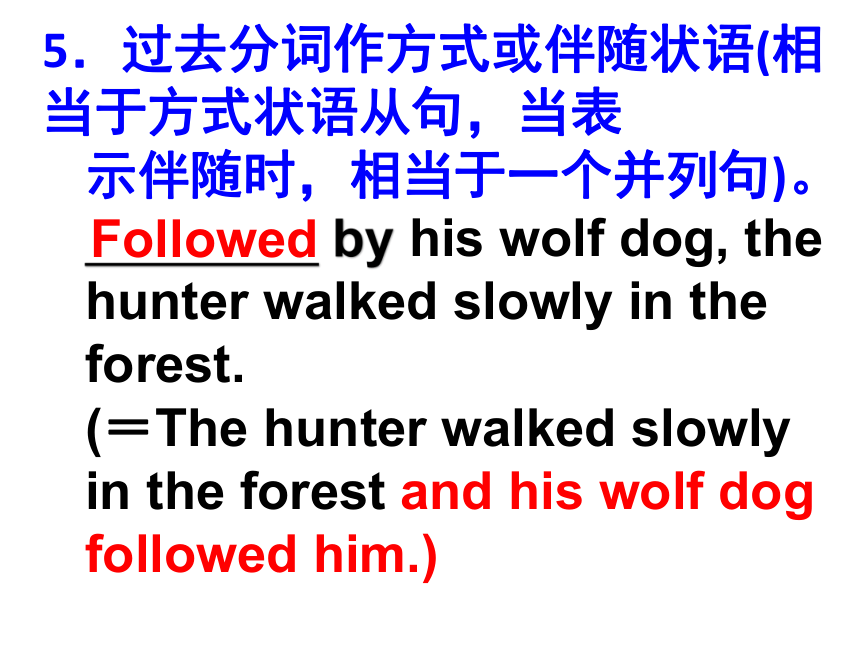
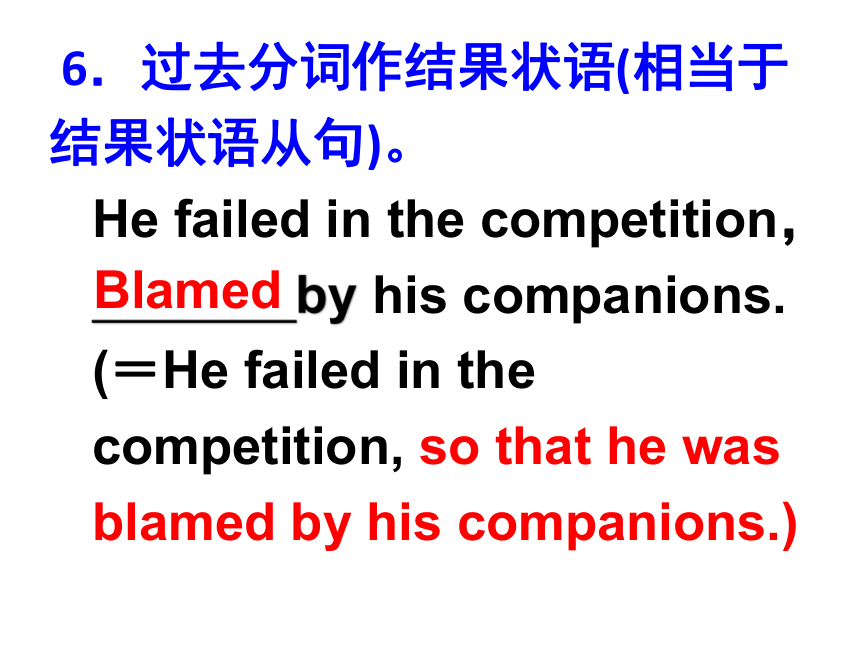
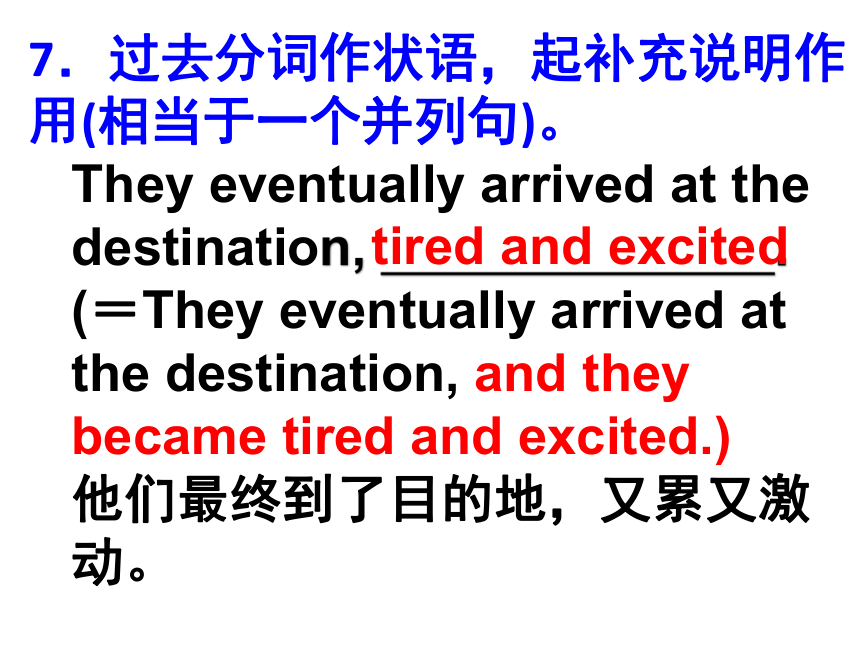
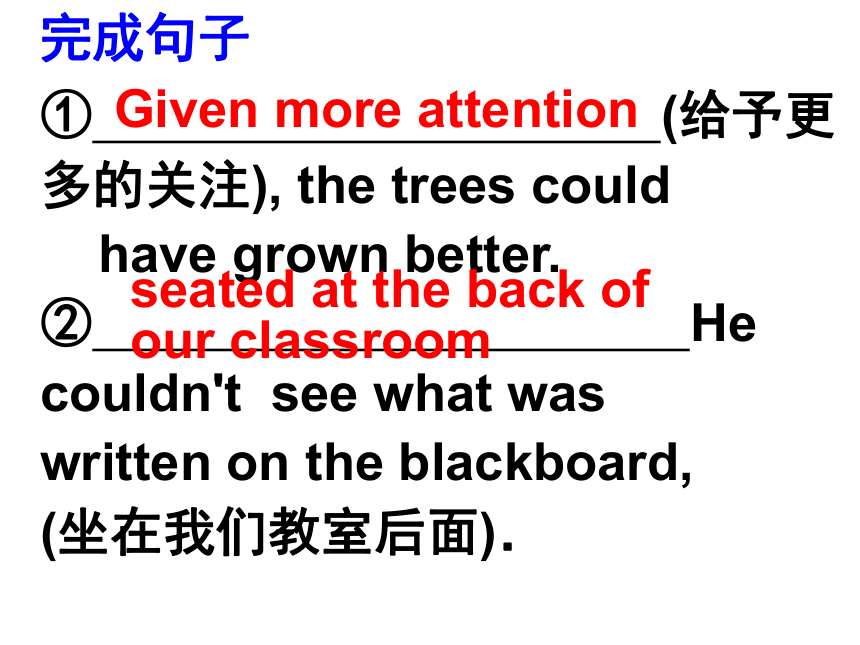
文档简介
课件29张PPT。过去分词作状语 过去分词作状语的用法
1.过去分词作时间状语(相当于时间状语从句)。
from the hill, the village looks more beautiful.
(=When it is seen from the hill, the village looks more beautiful.)Seen2.过去分词作原因状语(相当于原因状语从句)。
by the stones flying at them from all sides,the boys ran into the building.
(=Because they were confused by the stones flying at them from all sides, the boys ran into the building.)Confused3.过去分词作条件状语(相当于条件状语从句)。
more time and support, we could have done it better.
(=If we were given more time and support, we could have done it better.)
如果当时给我们更多的时间和支持,我们会做得更好。Given4.过去分词作让步状语(相当于although/though引导的让步
状语从句)。
many times, the residents in London didn't give in.
(=Although they were attacked many times, the residents in London didn't give in.)Attacked5.过去分词作方式或伴随状语(相当于方式状语从句,当表
示伴随时,相当于一个并列句)。
by his wolf dog, the hunter walked slowly in the forest.
(=The hunter walked slowly in the forest and his wolf dog followed him.)
Followed 6.过去分词作结果状语(相当于结果状语从句)。
He failed in the competition,
by his companions.
(=He failed in the competition, so that he was blamed by his companions.)Blamed7.过去分词作状语,起补充说明作用(相当于一个并列句)。
They eventually arrived at the destination, .
(=They eventually arrived at the destination, and they became tired and excited.)
他们最终到了目的地,又累又激动。?tired and excited① (给予更多的关注), the trees could
have grown better.
② He couldn't see what was written on the blackboard, (坐在我们教室后面).Given more attentionseated at the back of our classroom完成句子③After his journey from abroad,Richard Jones returned home,
(筋疲力尽).
④He spent there a whole night,
.
(锁在房间里).exhaustedlocked in the room⑤The old man went into the room, . (由他的妻子搀扶着).supported by his wife注意事项:
1.过去分词作状语时,其前面可以带有相应的连词when,
though, although, as if, as though, if, unless, until, once等。
Unless invited, I won't attend the ball.注意事项:
2.过去分词所表示的动作,必须是逻辑主语所承受的动作。
如果分词的逻辑主语与主句的主语不一致,则可以用下列方法来修正:
①给分词添加自己的主语,构成独立主格结构;
②给分词改变语态(现在分词与过去分词转换);
③用相应的状语从句来表达; ④用with 复合结构。 例如:完成作业后,孩子们出去踢球了。
(判断正误) Finished their homework, the children went out to play football.
句子可改为: 1) Their homework , the children went out to play football.(用独立主格结构)
2) their homework, the children went out to play football.(用分词短语)
finishedHaving finished3) After their homework, they went out to play football.(用时间状语从句)
4) With , the children went out to play football. (用with复合结构)
the children finishedtheir homework finished3.有些常见的分词结构属于固定结构,其逻辑主语不需要和主句主语一致,也就是说,它们的主语和句子的主语没有关系,如: compared with,
judging from/by,
generally/exactly speaking,
considering, seeing,
including/included,
supposing/providing/provided 等。 1) Judging from his appearance,he is a wealthy man.
2) Generally speaking, the more you pay, the more you get.4.v.-ed分词作状语时,否定形式为:否定词放在分词的前面。即:
Not+v.-ed
或Never+v.-ed
或Hardly+v.-ed等。
Not asked, he told it to them.
虽没人问,他却跟他们说了那件事。5.有些过去分词已用作形容词,常用于系表结构,作状语时不表被动动作而表状态。这样的过去分词及短语常见的有:
seated(坐), hidden(躲), absorbed in(沉溺于), born(出生), dressed in(穿着), tired of(厌烦)等。
Tired of the city life, she desired to live in peace in the country.①If (connect) to the campus network, you can get to it directly from your computer.
②The flowers (smell) sweet in the garden attract
many visitors.connected用所给词的适当形式填空smelling③When first .
(introduce) to the market, these products enjoyed a great success.
④With trees, flowers and grass
(plant) everywhere, my hometown has taken on a new look.
introducedplanted
⑤Once (ask) about her father, the girl will burst out
crying.asked 1. Read and rewrite the sentneces:2. Complete the sentences:
1)
2)
3)
4)
5)visited Exercises on Page 60-61Known LostInvitedGiven 1. Match the phrasal verbs with their meanings. 1) 2)
3) 4)
5) 6)
7)bExercises on Page 63fgcdae 2. Complete the sentences. 1)
2)
3)
4)
5)
6)
7)come acrossExercises on Page 63think overfell forheard ofput upmake upgo on
1.过去分词作时间状语(相当于时间状语从句)。
from the hill, the village looks more beautiful.
(=When it is seen from the hill, the village looks more beautiful.)Seen2.过去分词作原因状语(相当于原因状语从句)。
by the stones flying at them from all sides,the boys ran into the building.
(=Because they were confused by the stones flying at them from all sides, the boys ran into the building.)Confused3.过去分词作条件状语(相当于条件状语从句)。
more time and support, we could have done it better.
(=If we were given more time and support, we could have done it better.)
如果当时给我们更多的时间和支持,我们会做得更好。Given4.过去分词作让步状语(相当于although/though引导的让步
状语从句)。
many times, the residents in London didn't give in.
(=Although they were attacked many times, the residents in London didn't give in.)Attacked5.过去分词作方式或伴随状语(相当于方式状语从句,当表
示伴随时,相当于一个并列句)。
by his wolf dog, the hunter walked slowly in the forest.
(=The hunter walked slowly in the forest and his wolf dog followed him.)
Followed 6.过去分词作结果状语(相当于结果状语从句)。
He failed in the competition,
by his companions.
(=He failed in the competition, so that he was blamed by his companions.)Blamed7.过去分词作状语,起补充说明作用(相当于一个并列句)。
They eventually arrived at the destination, .
(=They eventually arrived at the destination, and they became tired and excited.)
他们最终到了目的地,又累又激动。?tired and excited① (给予更多的关注), the trees could
have grown better.
② He couldn't see what was written on the blackboard, (坐在我们教室后面).Given more attentionseated at the back of our classroom完成句子③After his journey from abroad,Richard Jones returned home,
(筋疲力尽).
④He spent there a whole night,
.
(锁在房间里).exhaustedlocked in the room⑤The old man went into the room, . (由他的妻子搀扶着).supported by his wife注意事项:
1.过去分词作状语时,其前面可以带有相应的连词when,
though, although, as if, as though, if, unless, until, once等。
Unless invited, I won't attend the ball.注意事项:
2.过去分词所表示的动作,必须是逻辑主语所承受的动作。
如果分词的逻辑主语与主句的主语不一致,则可以用下列方法来修正:
①给分词添加自己的主语,构成独立主格结构;
②给分词改变语态(现在分词与过去分词转换);
③用相应的状语从句来表达; ④用with 复合结构。 例如:完成作业后,孩子们出去踢球了。
(判断正误) Finished their homework, the children went out to play football.
句子可改为: 1) Their homework , the children went out to play football.(用独立主格结构)
2) their homework, the children went out to play football.(用分词短语)
finishedHaving finished3) After their homework, they went out to play football.(用时间状语从句)
4) With , the children went out to play football. (用with复合结构)
the children finishedtheir homework finished3.有些常见的分词结构属于固定结构,其逻辑主语不需要和主句主语一致,也就是说,它们的主语和句子的主语没有关系,如: compared with,
judging from/by,
generally/exactly speaking,
considering, seeing,
including/included,
supposing/providing/provided 等。 1) Judging from his appearance,he is a wealthy man.
2) Generally speaking, the more you pay, the more you get.4.v.-ed分词作状语时,否定形式为:否定词放在分词的前面。即:
Not+v.-ed
或Never+v.-ed
或Hardly+v.-ed等。
Not asked, he told it to them.
虽没人问,他却跟他们说了那件事。5.有些过去分词已用作形容词,常用于系表结构,作状语时不表被动动作而表状态。这样的过去分词及短语常见的有:
seated(坐), hidden(躲), absorbed in(沉溺于), born(出生), dressed in(穿着), tired of(厌烦)等。
Tired of the city life, she desired to live in peace in the country.①If (connect) to the campus network, you can get to it directly from your computer.
②The flowers (smell) sweet in the garden attract
many visitors.connected用所给词的适当形式填空smelling③When first .
(introduce) to the market, these products enjoyed a great success.
④With trees, flowers and grass
(plant) everywhere, my hometown has taken on a new look.
introducedplanted
⑤Once (ask) about her father, the girl will burst out
crying.asked 1. Read and rewrite the sentneces:2. Complete the sentences:
1)
2)
3)
4)
5)visited Exercises on Page 60-61Known LostInvitedGiven 1. Match the phrasal verbs with their meanings. 1) 2)
3) 4)
5) 6)
7)bExercises on Page 63fgcdae 2. Complete the sentences. 1)
2)
3)
4)
5)
6)
7)come acrossExercises on Page 63think overfell forheard ofput upmake upgo on
